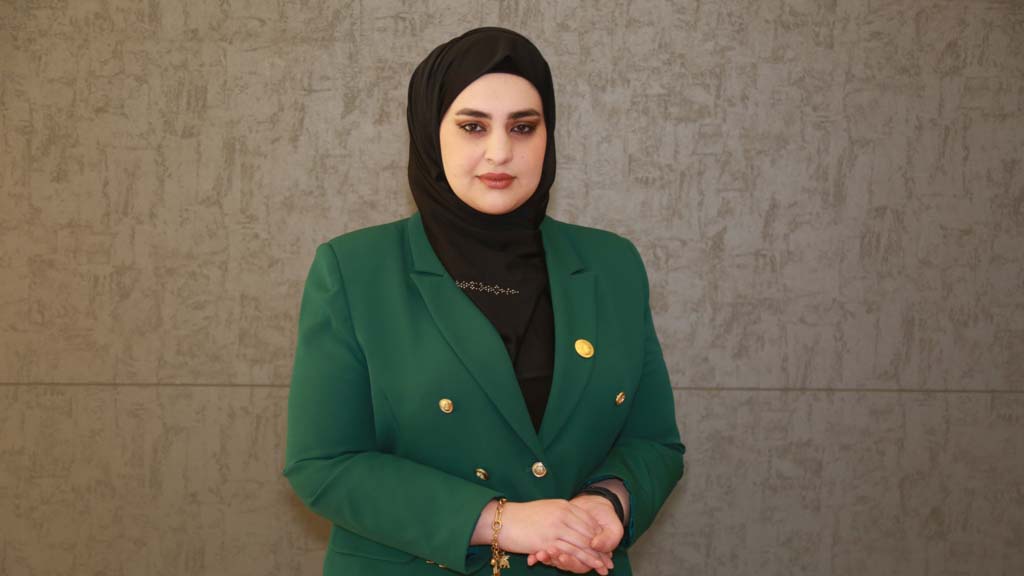She lead the search for family members kidnapped by ISIS
After years of trying to find answers and justice for her father, Dalya Mahmood Almaamary was finally able to get the Iraqi Parliament to increase their budget for finding and identifying missing family members kidnapped by ISIS.

A few years ago, Dalya Mahmood Almaamary lost her father during the ISIS occupation. He was one of numerous victims who went missing and many families, including Dalya’s, still know nothing about what happened to them. Together with other activists and women searching for their family members, Dalya set out to find answers.
“I had a dream to get the voices of the women heard and get them the assistance that they needed. At first, I wasn’t able to—I didn’t have the right tools. I was blaming the people responsible and attacking the government. But then I started to think that we should discuss solutions and not only the problems,” says Dalya.
Learning advocacy tools
Dalya worked to find ways to bring attention to her cause. She wanted to advocate for the missing people and through Ahel, one of The Kvinna till Kvinna Foundation’s partner organisations, she was equipped with knowledge and tools that enabled her to organise a campaign.
“After the training, I understood that we have to build a relationship with the parliament representatives. Thanks to my moral duty, I was able to share my feelings with others, something that helped me greatly,” Dalya says.
Launching the campaign
Dalya teamed up with five activists and 20 women who were mothers or wives of missing people to launch the campaign called “Where are the missing people abducted by ISIS or Daesh?”. At a roundtable discussion organised by Kvinna till Kvinna, Dalya was one of the participants who was able to meet with the Iraqi Parliament to tell them about her campaign.
“We got to meet members of the Iraqi Parliament who hosted us in the Council of Representatives and tell them the reasons why we launched the campaign and want to have the voices of the women heard,” says Dalya.
The campaign was a success and after another couple of meetings the request for the Iraqi Parliament to increase their budget to open an investigation and conduct DNA testing to identify missing family members was accepted.
“We did our best and I feel that the voices of the women became stronger. The parliament members changed their impression about us, especially when they saw that we knew how to organise meetings with the local authorities,” says Dalya.
Being a voice for young women
Being a young woman advocating for change is never easy, and Dalya has met many challenges along the way.
“The biggest challenge was for us was that we wanted to continue the campaign but we were afraid that this issue would be forgotten. Since our ultimate goal was to know the destiny of the missing people, we were concerned that if something would happen, the campaign would end. Especially since there are some people in the government who don’t want to uncover these issues,” Dalya says.
Dalya has learned a lot through her training and she is proud to see all the hard work get paid off.
“Frankly speaking, I’m happy with myself. I’m proud to be the voice of the community. My family, my neighbors, my friends—women who couldn’t get their voices heard before I represented them.”
She also sends a special “thank you” to Kvinna till Kvinna and senior programme officer, Hadeel Hazim.
“Ms Hadeel has been like an older sister supporting me through every single moment, she was the one who encouraged me.”
Looking forward
Dalya’s path might have started through her campaign to find answers about her father and other missing people, but it is just the beginning. Today, she is studying for her humanitarian master where she is planning on writing her thesis on women in conflicts and how women were treated during the ISIS occupation.
“My dream in the future is to be one of the decision makers that can help women and to be one of the members in the Human Rights Commission operating in Iraq.”
Kvinna till Kvinna has supported women’s rights in Iraq since 2005—and defended women’s rights in areas affected by war and conflict since 1993. Read more about our work in Iraq »